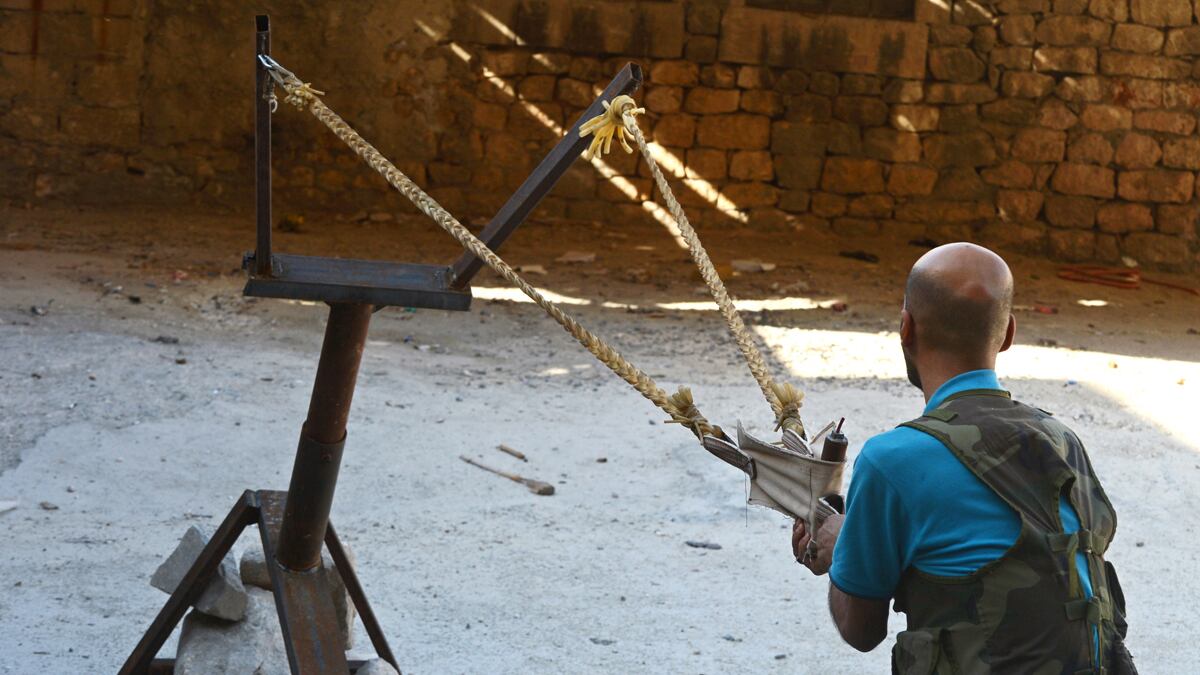When Abdallah removed the blindfold, I found myself in the center of one of the Free Syrian Army’s infamous “candy factories,” the secret rebel arms workshops developed in the absence of an adequate weapons supply. FSA Candy Factories have popped up in many of the “liberated” communities of Syria’s north as militias transform sheds, warehouses, and even caves into makeshift laboratories for the armed resistance.

In a rural community just outside Aleppo, this particular candy factory was located inside a private family’s barn. My guide, 31-year-old Abdallah, was a farmer before the uprising but now serves in his local katiba, a loose collection of neighboring families that together form one of the FSA’s peripheral militias. Abdallah explained that rural communities like his serve as prime sites for weapons’ production because of the ample availability of agricultural tools, equipment, and chemicals.
“Some of these weapons get a little bit dirty,” Abdallah admitted. “But we have nothing else, and we have to defend ourselves. When you see with your own eyes what he [Syrian president Bashar al-Assad] did to us, you know that it’s us or them.”
As the uprising approaches its 20th month, more than 25,000 Syrians have lost their lives in the conflict, and millions have been displaced. Nearly 300,000 Syrian civilians have fled to neighboring countries, while bloody urban warfare continues to engulf several of Syria’s oldest cities. In recent months, the Assad regime heightened its aerial bombardment of FSA strongholds, brutally punishing civilians and militants alike in Syria’s north.
“The barrel bombs [industrial barrels of TNT and shrapnel dropped from government planes] just keep coming ... We know that the world has forgotten us,” shrugged Abdallah. “We have to do everything for ourselves in Syria; we even had to make our own no-fly zones.”
Though the U.N. General Assembly voted overwhelmingly to condemn the actions of the Assad government in February, both China and Russia vowed to veto any punitive measures against the regime. Though Russia’s arms sales to Assad reveal the most obvious conflict-of-interest in the Security Council, China and Russia point to Libya as an example of the West’s abuse of previous U.N. mandates. China and Russia argue that NATO escalated their mandate for a no-fly zone to one of regime-change against former Libyan dictator Muammar Gadaffi, and thus both nations have used their power in the Security Council to prevent any military intervention in Syria.
The no-fly zones to which Abdallah referred are a collection of pickup trucks with makeshift DShK machine guns, stationed guns or rocket launchers in the truck’s bed. The “dushkas,” as they’re called, patrol several of the northern villages in an effort to shoot down the circling government planes. Their attempts, usually in vain, exemplify the lopsided nature of the ongoing conflict: Assad’s Russian-supplied integrated air-defense system versus the homemade rockets of the FSA.
“The dushka no-fly zones should be a disgrace to the world,” said Abdallah, shaking his head with disgust.
Despite reports of foreign arms shipments, the majority of the FSA’s armaments are supplied domestically, namely from raids on government bases and from sources within the regime’s ranks. Though both Saudi Arabia and Qatar have provided millions in funding and small arms to the rebels, the West has prevented any escalation in terms of weaponry, fearful of arming the fundamentalist sects and foreign jihadis within the FSA’s ranks.

“Because we are alone, we had to get creative,” Abdallah said, smiling, as he ushered me through the blacksmiths and engineers in his barn. Abdallah introduced me to Hassan, a former mechanic, and Ahmad, a former government engineer, who moved from Aleppo onto Abdallah’s family farm to work in the candy factory. “You make friends you could have never expected from the Revolution,” laughed Abdallah.
Hassan and Ahmad were busily at work on their latest invention, The “coffee-cup bomb,” in which an actual coffee mug sits at the base of the bomb and must be shattered in order to detonate the explosion. The men explained that many of their inventions are hybrids of weapons stolen from the regime, usually combined with local supplies from the countryside and shrapnel from Aleppo. Ahmad explained that they found instructions online for many of the bombs but that some of their products were Syrian innovations.
“Made in Aleppo,” he proclaimed with a grin, holding a bomb laced with crooked nails and screws along its perimeter.
Hassan and Ahmad said that other men in the shop were working on another FSA invention, rockets called the Hangover 1 and the Hangover 2, named for their spiraling and unpredictable paths.
“It’s dizzy, like a drunk person or when you’re hung over,” said Hassan playfully.
The men chattered jovially but quickly turned sour when asked about the civilian implications of their rudimentary weaponry. After some arguing, Ahmad spoke earnestly.

“I worked in transportation for the City of Aleppo, I was a civil servant my entire life,” he reflected.
“He [Assad] killed my wife, my children, and two of my neighbors with a barrel bomb [from a government airplane]. There was no FSA in my neighborhood, there was no reason to hit us. I wouldn’t be doing this if we in Syria had any other choice.”
Lama Fakih, a Syria country researcher at Human Rights Watch, explains the legal repercussions of indiscriminate weapons. “We have yet to assess the use, if any, of indiscriminate arms among Syria’s armed opposition,” she said. “But using any weapons indiscriminately, in a way that potentially endangers the civilian population, is a violation of international humanitarian law and can be investigated by the International Criminal Court.”
As the evening neared, the candy factory tour concluded, and we made our way past the piles of AK47s lining the walls and the rows of workstations throughout the barn. As Abdallah reemerged with my blindfold, Ahmad spoke.
“We aren’t like Assad,” Ahmad insisted.
“You see, we have to clean Syria of his mess,” he hesitated. “We all wish we didn’t have to wash her with our blood.”





